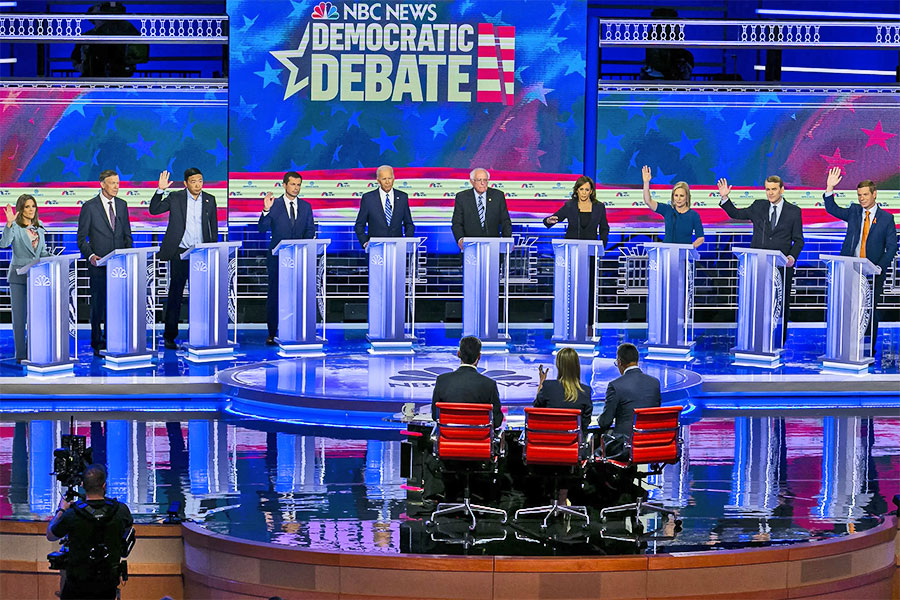Pete Buttigieg made history at the first round of Democratic debates. On the eve of Pride, Buttigieg’s presence was the first out gay candidate in a presidential debate. He is also one of the top contenders for the Democratic presidential nomination, rising in the polls over the past six months, now ranked fifth according to Politico.
While LGBTQ issues were not raised in questions from the five MSNBC moderators, several candidates, including Buttigieg, highlighted those issues.
Sen. Kirsten Gillibrand (D-NY), who brought attention to the transgender military ban when she brought Lieutenant Commander Blake Dremann, a transman, as her guest to the State of the Union address in January said, at one point, “I stood up to the Pentagon and repealed Don’t Ask/Don’t Tell,” the gay military ban.
Both Sen. Kamala Harris (D-CA) and Gillibrand also referenced the Equality Act on the second debate night.
Former Vice-President Joe Biden and Sen. Bernie Sanders (I-VT) were the frontrunners going in and appeared center stage on the second night, flanked by Buttigieg and Harris. On the first night, the top-polled Democrat was Sen. Elizabeth Warren (D-MA), the only candidate on that night polling in double digits.
Post-debate, news outlets were unanimous in citing Warren and Harris as the winners of the debates, with Harris rising exponentially in the polls immediately after, doubling her ranking and tying her with Warren for third place. Pundits agreed Buttigieg solidified his standing.
Despite Buttigieg’s presence on night two, the first night provided the most attention to LGBTQ issues. Former HUD Secretary Julian Castro, when asked a question about abortion rights, affirmed his support for “reproductive justice,” and noted about abortion rights, “Let’s also not forget someone in the trans community, a trans female, is poor, doesn’t mean they shouldn’t have the right to exercise that right to choose.”
While Castro did add transpersons to the repro rights discourse, he likely meant “transman” and was not corrected by any of the moderators, including Rachel Maddow. Nor did news outlets raise this post-debate.
Rep. Tulsi Gabbard (D-HI) came to the debates with a history homophobia. Gabbard issued a YouTube apology for her past behavior and votes in January after she announced her candidacy.
Moderater Chuck Todd, news director at NBC asked Gabbard directly why the LGBTQ community should trust her now.
Gabbard replied, “Let me say that there is no one in our government at any level who has the right to tell any American who they should be allowed to love or who they should be allowed to marry. My record in Congress for over six years shows my commitment to fighting for LGBTQ equality. I serve on the Equality Caucus and recently voted for passage of the Equality Act.”
She added, “Maybe many people in this country can relate to the fact that I grew up in a socially conservative home, held views when I was very young that I no longer hold today. I’ve served with LGBTQ service members, both in training and deployed downrange. I know that they would give their life for me and I would give my life for them. It is this commitment that I’ll carry through as president of the United States, recognizing that there are still people who are facing discrimination in the workplace, still people who are unable to find a home for their families. It is this kind of discrimination that we need to address.”
Gabbard was an elected official when she was “very young” and espoused these views. As a member of the Hawaii state legislature, Gabbard said, “As Democrats we should be representing the views of the people, not a small number of homosexual extremists.” She also opposed help for LGBTQ students in Hawaii schools, disavowing that there was bullying.
Gabbard asserts she has changed positions, and joined the unanimous House Democratic support for the Equality Act in May.
Sen. Cory Booker (D-NJ) challenged Gabbard, saying her support for the Equality Act was “not enough.”
Booker said, “We do not talk enough about trans Americans, especially African-American trans Americans, and the incredibly high rates of murder right now. We don’t talk enough about how many children, about 30 percent of LGBTQ kids, who do not go to school because of fear. It’s not enough just to be on the Equality Act. I’m an original cosponsor. We need to have a president that will fight to protect LGBTQ Americans every single day from violence in America.”
While Buttigieg was given no LGBTQ-centered question, he inserted his gay experience at several points, referencing his husband Chasten when talking about the couple’s shared student loan debt. In his closing, Buttigieg detailed his experiences as a soldier and a mayor, and also said, “I’ve experienced being in a marriage that exists by the grace of a single vote on the U.S. Supreme Court.”
The next round of debates will be held July 30 and 31 in Detroit, Michigan, a state Hillary Clinton lost by less than 10,000 votes in 2016, amid outcry from the black community over voter suppression. The same rules about polling and donors apply for that debate. It is expected that some of the current candidates may withdraw from the race before then.
